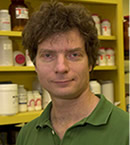 |
Professor Department of Microbiology and Immunology Ph.D., Oxford University, 1981
|
|
|
E-mail: |
bruce.futcher@stonybrook.edu |
|
Publications |
Scaling gene expression for cell size control and senescence in S. cerevisiae. Chen, Futcher. Current Genetics, 2020. Differential scaling of gene expression with cell size may explain size control in budding yeast. Chen, Zhao, Zahumensky, Honey, and Futcher. Molecular Cell, 2020. Re-annotation of 12,495 prokaryotic 16S rRNA 3’ ends and analysis of Shine-Dalgarno and anti-Shine-Dalgarno sequences. Amin, Yurovsky, Chen, Skiena, Futcher. PLoS One, 2018. Cyclin-Dependent Kinase Co-Ordinates Carbohydrate Metabolism and Cell Cycle in S. cerevisiae. Zhao, Chen, Carey, Futcher. Molecular Cell, 2016. Measurement of average decoding rates of the 61 sense codons in vivo. Gardin, Yeasmin, Yurovsky, Cai, Skiena, Futcher. E-Life 2014. |
|
|
Research |
The lab’s approach is a combination of molecular genetics in yeast and computational analysis. Computational approaches are often in collaboration with Dr. Steve Skiena of the Computer Science Department. Different members of the lab use different combinations of wet-lab experiments and computer analysis, ranging from purely experimental (Zhao et al. 2016) to purely computational (Amin et al. 2018). The lab’s research interests are varied, but the main two are the control of cell division, and mechanisms of protein translation. Cell Division. The main interest in our lab is the control of cell division. This control is surprisingly similar in all eukaryotes, from yeast to humans. It involves a family of unstable proteins called “cyclins” that bind and activate a “cyclin dependent kinase” (CDK) called Cdc2. Activation of CDK protein kinase drives cells into cell division. The abundance of cyclins is regulated several ways, but in particular cyclin abundance may depend on the size of the cell, such that small cells cannot divide, while large cells must divide (Chen et al., 2020; 2020). Control of cell division is a cancer problem, because cancer cells divide persistently when they should not divide at all. Understanding yeast mechanisms for cyclin and CDK control of cell division has recently led to the development of several anti-cancer drugs, including Ibrance, Verzenio, and Kisqali. Protein Translation. A second interest in the lab is protein translation. With Eckard Wimmer, a virologist in the Department, and with Steve Skiena, we found that different ways of encoding a gene, with all encodings ostensibly making exactly the same protein, led to vastly different efficiencies of protein synthesis. This may be a useful approach for making vaccines: a synthetic virus with poor encodings is often not virulent, but nevertheless induces antibody production and immunity (Coleman et al. 2008; Yang et al. 2013). We are studying the mechanisms by which different synonymous encodings of the same protein lead to different outcomes. In addition, it appears that in some or many cases, cells are using a novel method to initiate protein synthesis, and we are characterizing this. |
|

